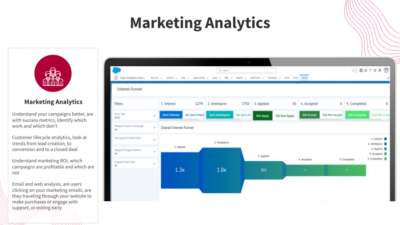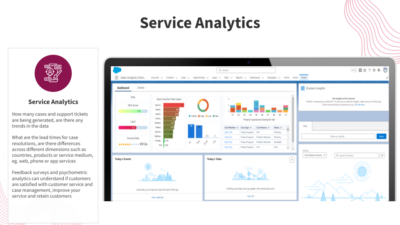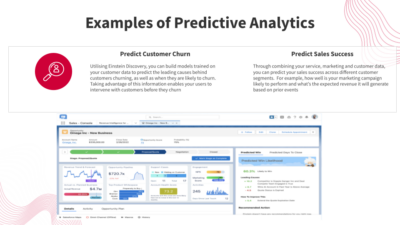Blog
18/03/2025
Unlock actionable insights with CRM Analytics
Customer relationship management (CRM) software is a core component of an organisation's tech stack, and most businesses have such a system in place. Think of it as a centralised hub for capturing, tracking, nurturing, and converting leads.
Enterprises can tap into their CRM data to automate sales and marketing processes, optimise customer interactions, and streamline reporting, among other activities. In a Salesforce survey of 443 wealth management firms, 70% of respondents reported using CRM tools to strengthen client relationships, whereas 58% said they deploy them to manage their practice.
"The CRM is now the platform to unite all teams around the customer."
However, this technology has become increasingly complex in recent years, posing both opportunities and challenges for businesses. Modern CRM systems come with advanced reporting capabilities, automations, and other features that require technical know-how. Their capabilities are often underutilised, preventing companies from fully leveraging the data they have.
That’s where a robust CRM analytics solution can help. This service enables organisations to turn CRM data into actionable insights and gain a full picture of their processes. The result? Better decision-making, more efficient operations, and improved customer retention.
What is CRM Analytics?
CRM analytics encompasses the processes and technologies used to collect, organise, and assess the data in customer relationship management systems. Its role is to help companies turn this data into business intelligence.
This tool can benefit enterprises of all sizes—especially those with complex sales cycles, multiple stakeholders, or a large customer base. The insights gained from CRM analytics allow businesses to better understand what works and what doesn’t, optimise their sales and marketing efforts, and predict future trends.
If your organisation uses Salesforce, you can leverage its built-in CRM Analytics to gain a 360-degree view of the customer journey. This business intelligence tool combines data from Salesforce and external sources, creating interactive reports to help companies uncover opportunities, trends, patterns, and operational bottlenecks.
Standard Salesforce reports are good enough for most use cases but have some limitations. For example, they offer basic filtering options and lack advanced predictive capabilities. Plus, there is a cap on the number of data sources that can be combined within a single report.
By comparison, CRM Analytics (formerly Tableau CRM) generates highly customisable reports with advanced filtering options and dynamic AI-driven insights. These features allow for more comprehensive trend analysis, predictive forecasting, and complex data modelling, which can improve decision-making.
Types of Analytics
The first step to using CRM Analytics is to understand what kind of insights you can get from your data. These fall into several categories, with the most important being the following:
- Descriptive analytics: These insights revolve around qualitative and quantitative data on what has already happened (e.g., what products are most popular, which marketing campaigns perform best, or how many support tickets you received within a specific period).
- Predictive analytics: These are insights into what could happen in the future based on existing and historical data. For example, you can analyse marketing, service, and customer data to forecast sales success. Other data sets can help you predict customer churn, product demand, campaign performance, or revenue growth.
Descriptive analytics can help you understand what happened and why it happened. For instance, a B2B software company can analyse last quarter’s sales data to see which industries generated the most revenue. With these insights, the organisation can refine its marketing efforts and allocate resources more efficiently.
Predictive analytics, on the other hand, can forecast future trends and outcomes. Returning to the above example, a B2B software company can predict which leads are most likely to convert based on historical sales patterns and customer behaviour data. This would allow its sales and marketing teams to identify and prioritise high-value accounts, resulting in higher ROI.
With CRM Analytics, you can leverage descriptive analytics to gain deeper insights into your operational performance, sales trends, customer needs, and other aspects. At the same time, its predictive analytics capabilities help uncover future opportunities, identify at-risk accounts, and pinpoint areas for improvement, allowing businesses to be more proactive rather than reactive.
Unlock actionable insights with CRM Analytics
Imagine being able to track the customer’s journey across all touchpoints, from the moment they discover your business to the first sale and beyond. Not only would you gain a deep understanding of their needs, but you’d be better able to anticipate their next move, tailor your messaging, and deliver the right solutions in the right place, at the right time.
With CRM Analytics, enterprises can visualise every step customers take by connecting data from emails, phone calls, social media, and other channels. This data enables them to proactively address the buyer’s needs and create hyper-personalised experiences.
“Instead of just using CRM to track leads or manage contacts, firms are using it to modernise their data strategies, incorporate AI and analytics, streamline advisor and client onboarding experiences, simplify workflow and task management, and enhance collaboration,” explains Feinstein.
CRM Analytics offers both immediate and long-term benefits, and you can team up with an experienced Salesforce partner like Fluido to maximise its impact. Let’s see a few examples:
- Unify data into a single source of truth: By integrating data from multiple sources, CRM Analytics provides a complete view of your customers and processes. The information is organised into datasets, lenses, apps, and dashboards, making it easier to analyse and visualise key business metrics.
- Retain more customers: This powerful tool enables your teams to monitor engagement trends and spot accounts at risk of churn. For example, a cloud storage provider can use CRM Analytics to predict which customers are least likely to renew their subscriptions based on product usage, engagement levels, and support ticket frequency. Based on these insights, marketing teams can launch retention campaigns to improve renewal rates.
- Forecast sales with greater accuracy: CRM Analytics leverages AI-driven predictive models to analyse historical sales data, current pipeline trends, and external factors like market conditions. Sales teams can use this information to identify opportunities, predict revenue, and adjust their strategies proactively.
- Achieve personalisation at scale: By analysing customer behaviour, purchase history, and related data, marketing teams can deliver consistent, tailored experiences across all touchpoints. Whether a customer engages with your business via email or social media, they will see the same message—regardless of the device used. This approach can improve their satisfaction while driving brand recognition and loyalty.
- Enhance operational efficiency: The insights gained from CRM Analytics can pinpoint operational issues, such as a high volume of complaints related to a particular service or process (e.g., software bugs or late deliveries). This data allows businesses to identify and address inefficiencies, leading to a better customer experience.
- Act on data in real-time: CRM Analytics features a built-in actions menu that allows you to create summaries, schedule appointments, send emails, track tasks, and more without leaving the platform. Simply put, you can act on your data as you go through it, resulting in higher efficiency.
- Generate user-friendly reports: Unlike similar tools, CRM Analytics has an intuitive interface with interactive charts, visual reports, and customisable dashboard pages. These features convey complex data into an easy-to-read format, making it accessible to users of different technical levels.
Not only does CRM Analytics help enterprises make sense of their data, but it can also streamline collaboration and boost productivity.
For example, it integrates with Slack, enabling teams and departments to share reports, dashboards, and insights. Plus, it’s mobile-friendly and meets all major compliance standards, such as the GDPR, HIPAA, and ISO, enabling seamless collaboration across global teams.
However, CRM Analytics isn’t a plug-and-play solution. While some of its features are accessible to most users, others involve a learning curve and require technical know-how. That’s where Fluido’s data scientists come in.
Make the most out of your CRM data
Fluido, a leading Salesforce Summit Consulting Partner in Europe, can set up CRM Analytics and empower your teams with actionable insights. Its delivery approach is standardised and efficient yet flexible enough to meet your organisational needs.
First, the professionals at Fluido will set a discovery meeting to learn more about the systems you have in place and your business objectives. They will also define the work methodology to be adopted. Next, they will identify the key performance metrics to focus on and develop an action plan.
Moving forward, Fluido’s teams will implement, configure, and customise CRM Analytics so you can make the most out of your data. Depending on your needs, they can assist with some or all of the following:
- Marketing analytics: A comprehensive analysis of your marketing data, combining insights from Salesforce Marketing Cloud and website data. The goal is to evaluate campaign performance and web traffic and their impact on sales and ROI.

- Service analytics: Fluido will analyse your Service Cloud data to determine how effective your support is across different channels. For example, they will want to see what your lead times are and whether there’s a correlation between customer satisfaction surveys and the support channels used.

- Customer/sales analytics: By analysing account activities and sales reports, Fluido can help you identify key drivers for conversions, such as engagement levels and top-performing communication channels. These insights will enable your sales and marketing teams to refine their strategies and build stronger client relationships.

- Predictive analytics: Fluido’s experts will go over your analytics data and other insights to identify the key predictors for sales and marketing success. Based on this information, they will devise a strategy to improve your campaign performance and boost conversions.

The experts at Fluido will also provide your staff with training and documentation prior to go-live, ensuring everyone knows how to use the platform. Once the system is up and running, they will offer ongoing support and collect feedback from your employees.
Fluido’s superheroes will guide you every step of the way, from strategy planning to execution and beyond. They are like a championship team—highly skilled and working seamlessly toward a common goal. Your success is their success, and they will use their expertise to turn your data into a superpower.
Partner with Fluido to get the most out of your CRM investment. Book a consultation or reach out directly to Thomas Stephen, Lead Business Consultant at thomas.stephen@fluidogroup.com to discuss your needs and see what you can achieve with CRM Analytics.

Thomas Stephen
Lead Business Consultant
thomas.stephen@fluidogroup.com
Read next
07/04/2025
